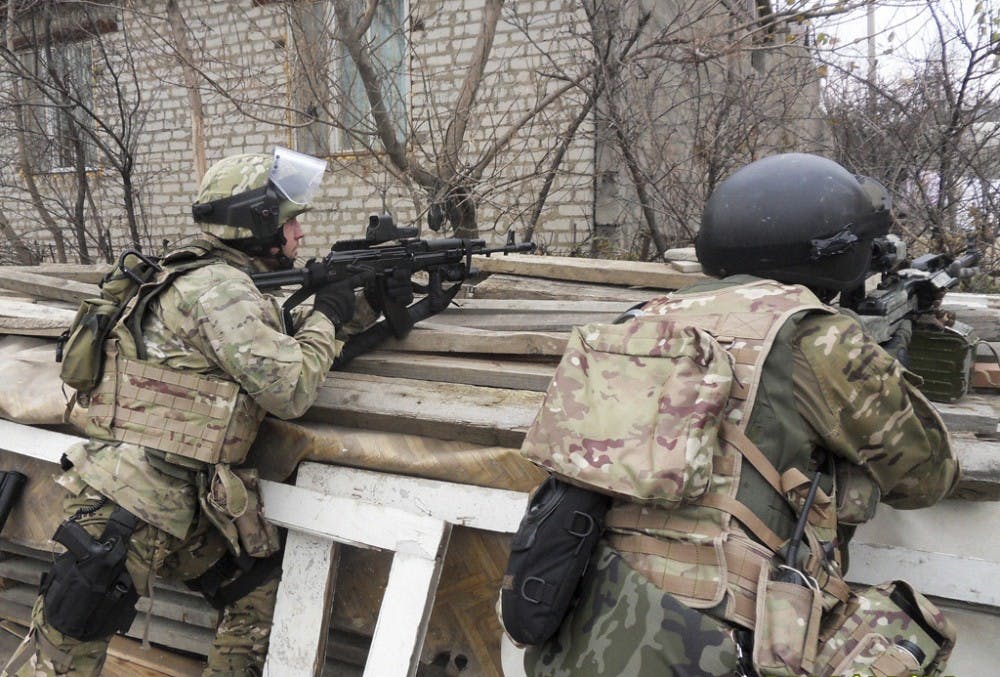By Patrick Neer | Echo
President Obama expressed reservations about supplying Ukraine with armaments and other military support on Monday, citing fears that such action may only serve to escalate the conflict which has ravaged the country for nearly a year, Reuters reported.
According to another Reuters report, Congress unanimously passed legislation in December authorizing sending arms to the new Kiev-based government. The arms would help Kiev defend itself against the Russian-backed separatist movements gathering in eastern Ukraine.
According to the New York Times, Russia has been shipping a large number of heavy weapons and support vehicles, including tanks and artillery platforms, to bolster the separatist offensives.
In his meeting with German Chancellor Angela Merkel on Monday, Obama signaled he would wait for the results of the most recent series of peace talks in Minsk to make his decision on arming Ukraine.
"It is true that if, in fact, diplomacy fails, what I've asked my team to do is to look at all options, but I have not made a decision about that yet," Reuters reported Obama said.
By speaking evasively about arming Ukraine, Obama places himself between two competing diplomatic elements: congressional interests at home pushing for military support and pressure from European leadership to remain militarily removed from the Ukrainian crisis.
Reuters reported that members of the U.S. House Armed Services Committee began drafting new legislation that would commit the U.S. to arming Kiev.
This push is supported by members of both parties across the government, including Obama's nominee for defense secretary, Ashton Carter and Republican Senator John McCain.
"The Ukrainians are being slaughtered and we're sending them blankets and meals.Blankets don't do well against Russian tanks," McCain said at a security conference in Munich.
In contrast, the German and French governments released statements against military aid to Ukraine. According to Al Jazeera America, both governments instead prefer to continue relying on increasingly harsh economic sanctions to blunt Russia's aggression.
"(Berlin) will not support Ukraine with weapons," Merkel said. "I am convinced this conflict cannot be solved by military means."
Obama must carefully weigh the consequences of his decision. In Monday's meeting with Merkel, Obama summarized his main reservations. "Can we be certain that any lethal aid that we provide Ukraine is used properly, doesn't fall into the wrong hands, does not lead to over-aggressive actions that can't be sustained by the Ukrainians?" Obama asked. "What kinds of reactions does it prompt, not simply from the separatists but from the Russians?"
Should the U.S. arm Ukraine, it would provide the beleaguered Kiev government with a new edge in ongoing hostilities.
Dmitri Trenin, an analyst from the Carnegie Moscow Center, stated in a recent report that arming Kiev would make a definitive statement against Russia's international aggression, but it also risks further escalating the conflict-creating a proxy war between two former Cold War adversaries as Russia and the U.S. supply combatants on opposite sides of the crisis.
Russo-U.S. relations - already chilled in light of economic sanctions and previous diplomatic clashes - could crumble further if Ukraine is supplied with American weapons.
Alternatively, abstaining from arming Ukraine would avoid direct conflict with Russia, but would risk allowing Ukraine to fall completely into the Russian bear hug.
In addition, Obama must consider his support at home. The presence of a strong bipartisan drive in Congress for sending arms cannot be ignored. If Obama decides against arming Ukraine, he may have to go head-to-head with Congress.





